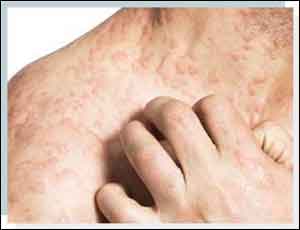- Home
- Editorial
- News
- Practice Guidelines
- Anesthesiology Guidelines
- Cancer Guidelines
- Cardiac Sciences Guidelines
- Critical Care Guidelines
- Dentistry Guidelines
- Dermatology Guidelines
- Diabetes and Endo Guidelines
- Diagnostics Guidelines
- ENT Guidelines
- Featured Practice Guidelines
- Gastroenterology Guidelines
- Geriatrics Guidelines
- Medicine Guidelines
- Nephrology Guidelines
- Neurosciences Guidelines
- Obs and Gynae Guidelines
- Ophthalmology Guidelines
- Orthopaedics Guidelines
- Paediatrics Guidelines
- Psychiatry Guidelines
- Pulmonology Guidelines
- Radiology Guidelines
- Surgery Guidelines
- Urology Guidelines
Water baths as good as bleach baths for treating eczema

For patients suffering from eczema (atopic dermatitis), dermatologists will sometimes recommend bleach baths to decrease bacterial infection and reduce symptoms. But a new Northwestern Medicine study found no difference in the effectiveness of a bleach bath compared to regular water baths. In addition, bleach baths can cause stinging and burning of skin, and occasionally even trigger asthma flare-ups in patients.
"I don't know if it throws the baby out with the bathwater, but bleach baths lack the evidence to support how commonly they are being recommended," said senior author Dr. Jonathan Silverberg. "The water baths appear to be doing most of the heavy lifting. If bleach is adding any benefit, it's quite modest."
Silverberg is an assistant professor of dermatology at Northwestern University Feinberg School of Medicine, a dermatologist at Northwestern Medicine and director of Northwestern Medicine's Multidisciplinary Eczema Center.
The study was published in the journal Annals of Allergy, Asthma, and Immunology.
The results should encourage patients with eczema to bathe regularly, Silverberg said. Many shy away from bathing for fear that it will dry out their skin, he noted.
A bleach bath is a bath with warm or cool water mixed with a small amount of bleach. Patients are instructed to submerge in the bath from the neck down and to avoid exposure to bleach near the eyes. Water baths contain only warm or cool water, and patients can use a bleach-free washcloth to wash their face.
Soap may not be necessary during water baths because it can be hard on sensitive skin, and Silverberg said soaking for 10 minutes in only water will effectively "wash away most the germs and crud from your skin." After the bath is complete, patients are encouraged to apply ample moisturizer.
The study, a systematic review, and meta-analysis of all available studies comparing bleach and water baths (four in total) showed water baths were just as effective as bleach baths at reducing the severity of the visible signs and extent of eczema and bacterial infection.
Bleach is an additional expense for patients, another reason water baths are a better alternative. Bleach also can stain towels, linens and other clothing, sting or burn the eyes and open sores on the skin, and Silverberg has seen some patients experience asthma flare-ups from the bleach fumes.
"Patients with eczema have much higher rates of asthma than non-eczema patients," Silverberg said. "Everyone's home setting is going to be different, and many bathrooms don't have great ventilation, so a warm bath that causes the bleach to fume can be the perfect setup to potentially have an asthma flare-up."
The study also highlights flaws and inconsistencies in current bleach bath studies. Many of the studies in the review did not control for whether patients immediately moisturized after the bath to prevent dryness. They also did not take into account if patients used soap or the types of soap they used in water baths.
"This study provides a blueprint for improving future bleach bath studies," Silverberg said.
For more details click on the link: http://dx.doi.org/10.1016/j.anai.2017.08.289

Disclaimer: This site is primarily intended for healthcare professionals. Any content/information on this website does not replace the advice of medical and/or health professionals and should not be construed as medical/diagnostic advice/endorsement or prescription. Use of this site is subject to our terms of use, privacy policy, advertisement policy. © 2020 Minerva Medical Treatment Pvt Ltd